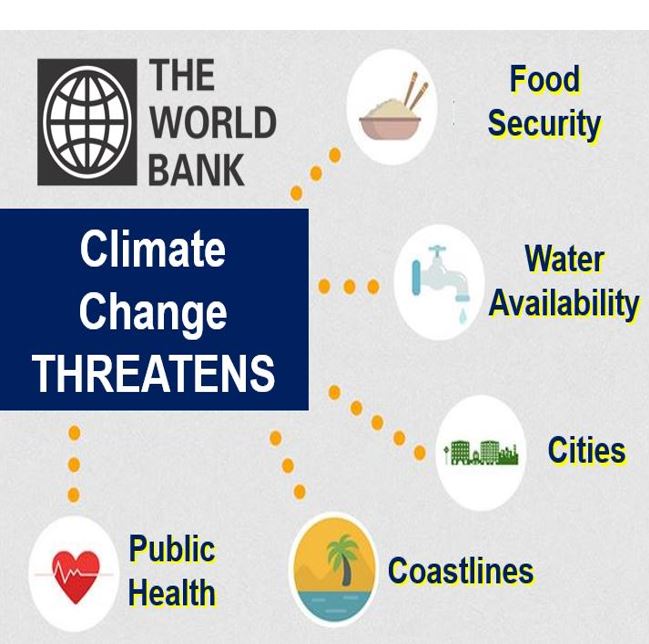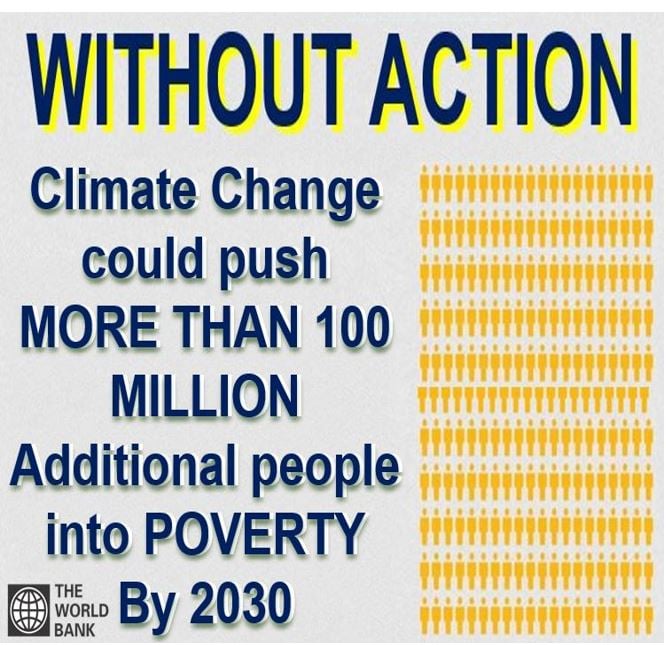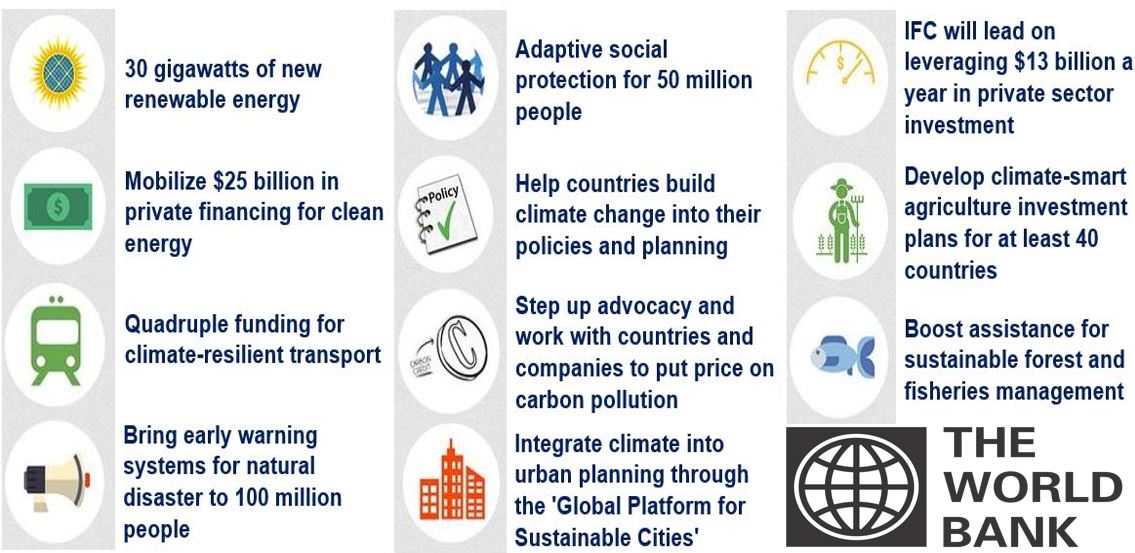The World Bank Group has announced plans to combat climate change with major investments to help developing nations add 40 gigawatts of renewable energy to global capacity. Thirty gigawatts is enough to power more than 150 million homes.
The World Bank Group, part of the United Nations system, an institution that provides loans to developing countries for capital programs, says it also wants to help bring early warning systems to 100 million people, and develop climate-smart farming investment plans for at least 40 nations – all by 2020.
 The World Bank Group says it is ramping up action in renewable energy, climate smart agriculture, sustainable cities, green transport and other areas – with ambitious targets for 2020. (Image: worldbank.org)
The World Bank Group says it is ramping up action in renewable energy, climate smart agriculture, sustainable cities, green transport and other areas – with ambitious targets for 2020. (Image: worldbank.org)
Climate Change Action Plan
These are some of the ambitious targets the World Bank has laid out in its Climate Change Action Plan, which was approved on 7th April, and aims to speed up efforts to combat climate change over the next five years and help developing nations deliver on their national climate plans submitted for the climate agreement reached in December 2015 at COP21 (the 2015 United Nations Climate Change Conference) in Paris.
The publication of the Climate Change Action Plan comes just two weeks before world leaders gather in New York to officially sign the Paris Agreement.
As part of the Paris agreement, 140 nations working with the World Bank lodged national climate plans, known as NDCs (Nationally Determined Contributions).
World Bank Group President, Jim Yong Kim, said:
“Following the Paris climate agreement, we must now take bold action to protect our planet for future generations.”
 The World Bank Group’s motto is ‘End Poverty’. Climate change could push 100 million additional people into poverty by 2030. (Image: adapted from worldbank.org)
The World Bank Group’s motto is ‘End Poverty’. Climate change could push 100 million additional people into poverty by 2030. (Image: adapted from worldbank.org)
“We are moving urgently to help countries make major transitions to increase sources of renewable energy, decrease high-carbon energy sources, develop green transport systems, and build sustainable, livable cities for growing urban populations.”
“Developing countries want our help to implement their national climate plans, and we’ll do all we can to help them.”
In order to maximize impact, the Action Plan focusses on helping nations shape national policies and leverage private sector investment.
Expanding climate investment
The International Finance Corporation (IFC), a member of the World Bank Group, says it plans to expand its climate investment from $2.2 billion annually today, to $3.5 billion per year by 2020. It also aims to leverage an additional $13 billion per year in the private sector.
Apart from its own financing, the World Bank says it also intends to mobilize $25 billion in commercial financing for renewable, clean energy over the next five years.
The World Bank group will also work more closely with developing nations to put a price on carbon pollution to create incentives for public and private sector decision makers to make well-targeted climate choices.
 According to the World Bank Group: “With the Action Plan, we will be helping countries to integrate climate change into their national policies, planning and budgeting; and to mobilize financing and use it for maximum impact.” (Image: adapted from worldbank.org)
According to the World Bank Group: “With the Action Plan, we will be helping countries to integrate climate change into their national policies, planning and budgeting; and to mobilize financing and use it for maximum impact.” (Image: adapted from worldbank.org)
The authors of the Action Plan say that climate change (global warming) can undermine efforts to end poverty – there is growing urgency to protect poor people and poor nations, they emphasized.
Laura Tuck, Vice President for Sustainable Development at the World Bank Group, said:
“Climate change is the defining issue of our time and cannot be tackled through isolated actions, one sector at a time. The complexity of the challenge requires solutions that cut across many different sectors such as energy, water, agriculture, transport, urban planning, and disaster risk management.”
“The World Bank is in a unique position to work with countries to develop the solutions that build their resilience to climate impacts, protect their people and environment, and reduce their emissions.”
Early warning systems
The World Bank Group plans to bring early warning systems to about 100 million people across fifteen developing nations, and help establish social safety nets – that can rapidly support those affected by an economic shock or disaster – to an additional 50 million poor people by the end of this decade.
The World Bank says it will pilot a new approach in fifteen cities that aims to improve urban resilience by integrating disaster risk management, land-use planning and infrastructure.
John Roome, Senior Director for Climate Change at the World Bank Group, warned:
“If we don’t act, climate change threatens to drive 100 million more people into poverty in the next 15 years. The Action Plan will allow us to help developing countries more quickly, and in the areas where support is most needed, such as disaster preparedness, social protection, and coastal protection.”
The Action Plan also explains how it aims to increase funding by a factor of four to make transport systems more resilient to climate change, as well as investing at least one billion dollars to promote energy efficiency and resilient building by 2020.
IFC says now is the time to promote the creation of climate-smart urban infrastructure. Its EDGE Green Building Program plans to have a presence in twenty markets within the next seven years.
The World Bank Group says it will develop climate-smart agricultural investment plans for at least forty nations, promote climate-informed fisheries management, and design sustainable forest strategies for fifty countries by the end of this decade.
‘Greening’ the financial sector
It also aims to help ‘green’ the financial sector through a coordinated approach across capital markets, pensions and banking to implement changes needed at national and international levels.
The World Bank Group will create special teams of specialists to work with countries to generate a robust pipeline of bankable projects, focusing on rooftop solar and boosting the growth of distributed solar in Sub-Saharan Africa.
In an official statement, the World Bank Group said:
“The Action Plan aims to deliver on the Bank Group’s commitment – announced in October 2015 – to increase climate financing to potentially $29 billion annually by 2020, with the support of its members.”
“It also sets out a new approach to take the growing threat of climate change into account across the Bank Group’s operations. Climate risk screening – which is already applied to projects supported by IDA, the World Bank’s fund for the poorest countries – will be extended across other World Bank operations in early 2017.”
Video – Economy and Climate Change
In this Sky News video, Jom Yong Kim, President of the World Bank, says 100 million additional people could be plunged into poverty by 2030 because of climate change.
